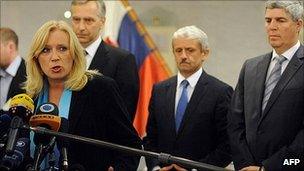Slovakia votes down eurozone bailout expansion plans
- Published

Slovakian Prime Minister Iveta Radicova had urged MPs to support the expansion measures
Slovakia's parliament has voted against measures to bolster the powers of the eurozone bailout fund, seen as vital in combating the bloc's debt crisis.
The governing coalition had linked the vote to a confidence motion and as a result has effectively been toppled.
Slovakia is the last of the eurozone's members to vote on expanding the European Financial Stability Facility.
However, the BBC's Rob Cameron says a second vote could be held soon and is likely to succeed.
The measure failed to pass by 21 votes, but that result had been anticipated after a junior party in the centre-right coalition said it would abstain.
The Freedom and Solidarity (SaS) party said it was opposed to Slovakia's taxpayers being asked to cover the debts of richer countries.
Many Slovaks feel their country - the second poorest in the eurozone - should not have to bail out countries like Greece.
Government officials said they would try to pass the EFSF expansion package in a second vote with support from the opposition, but no date has been fixed for that vote.
The socialist opposition Smer party - which also abstained - is expected to support the move but may make stringent demands including fresh elections.
Following the vote, Smer said it was up to the four parties in the toppled coalition to approach it with offers.
"We're saying 'no' to a rightist government, but we're saying 'yes' to the rescue fund," Smer leader Robert Fico said during the debate.
Slovak Prime Minister Iveta Radicova later said she had asked her coalition partners to begin talks with Smer.
During the debate she had urged MPs to vote in favour.
"It is the entire eurozone system which is under threat at the moment, not just a few small countries," she said.
"Our euro is under threat. The changing situation needs quick and immediate reaction."
To expand the powers of the EFSF bailout fund, all member states must agree on the measures proposed in July.
These include expanding the size of the fund to an effective lending capacity of 440bn euros ($600bn; £383bn).
They also include giving it the power to buy eurozone government debt and offer credit lines to member states and to banks.
The irony is that these plans, agreed in July, are now seen as inadequate, says the BBC's Matthew Price in Brussels.
Market analysts suggest the fund needs to be nearer 2 trillion euros to be effective.
Other plans agreed in July, to make private investors take a hit on any default by Greece on its debts, are also now seen as insufficient. Reports suggest leaders are contemplating a 50% cut rather than the 21% cut originally proposed.